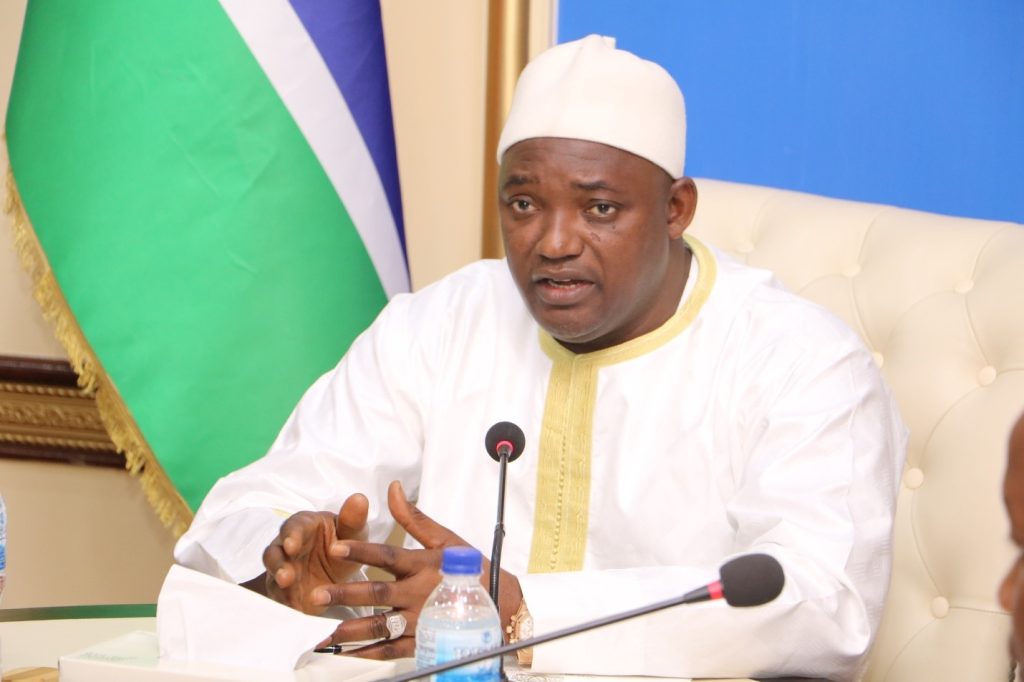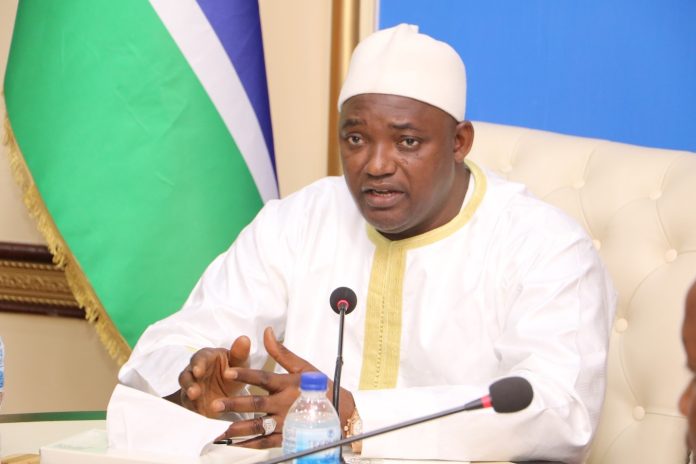Gambian president Adama Barrow looks on during the African Union summit at the palais des Congres in Niamey, on July 7, 2019. – African leaders met on July 7, 2019 in Niger for the African Union (AU) summit, to sign a landmark free trade agreement, and to discuss looming security and migration crises on the continent. (Photo by ISSOUF SANOGO / AFP) (Photo by ISSOUF SANOGO/AFP via Getty Images)

By Talibeh Hydara
For the first time since Gambia government announced an alleged coup attempt late last month, President Adama Barrow has spoken about the matter.

The president was criticised for not addressing the alleged coup attempt in his Christmas message to the nation, a few days after the event, which led to the arrest of at least six members of the Gambia Armed Forces.
However, in his traditional New Year’s address broadcast on Saturday, the president didn’t fail to mention the alleged coup plot this time.
“It is regrettable that a handful of soldiers recently planned to overthrow the democratically elected government of the day. The devastating consequences of illegally overthrowing a constitutionally elected government can never justify the means employed, nor the ill-advised purposes for such deadly crimes. Gambians have lived through a military regime, and they know how military takeovers have destabilised, disunited and isolated countries within the sub-region that struggle to live with them.
The Gambia is a multiparty democracy, and citizens can legally contest for public office if they wish. To do otherwise amounts to treason and carries severe penalties,” he said.
The president also praised the Intelligence Service and the GAF High Command for “boldly and promptly taking action to foil the plot”.
“They have demonstrated that, if we are united and vigilant as patriotic citizens, we will safely defend our country and continue our development programmes. These are times for national reconciliation and consolidation of our democratic institutions, and not time to revert to lawlessness, subversion, and unconstitutional tendencies,” he added.
The president also spoke about a variety of criminal activities which he said would not be tolerated, calling on the citizens to ensure a climate of safety for everyone.
He noted: “Because there are effective measures to ensure that justice prevails, all unlawful acts, mob justice inclusive, will not be tolerated. Wherever we may be, we must take charge to make our environment safe and maintain peace, law and order.
Our Security Sector Reform programme has progressed in building the capacity of our security forces. The Armed Forces are being re-oriented and motivated to enhance their role and responsibilities to assure maximum security in the country.
For their part, all citizens should take responsibility to control crime. While crimes reported to the police dropped in 2022, with public cooperation, burglary, domestic violence and other crimes could be reduced further.”
President Barrow equally but tersely mentioned the rising armed conflict on the border with Casamance which has in the recent past displaced Gambians.
Senegalese soldiers have also been accused of shooting Foñi residents, a boiling issue which has festered since 2017 and has made the region’s parliamentarians to jointly demand the immediate withdrawal of the troops.
“Along similar lines, those in border communities that experience sporadic armed conflicts should collaborate with the Security Services to secure the country. Our territorial integrity must never be compromised,” the president said.
Another biting criticism of the Barrow government is its handling of the acute kidney injury disaster which killed at least 70 children and no heads rolled.
The president established a taskforce to probe into the deaths while the National Assembly investigations could only find out what everyone already knew. The president admitted, even though it came a little late, the tragedy of the situation.
He said: “Lessons learned from the COVID-19 and AKI outbreaks have put us in a stronger position to strengthen our health system further. Meanwhile, the Task Force I set up is investigating the cause of the AKI outbreak and will submit its report in the New Year. We will review the report together with the recommendations from the National Assembly to inform Government’s decision on the matter.
The outbreak was indeed tragic. We sympathise with all the families and persons affected and mourn the loss of those precious Gambian children. I assure the nation that the Government will do all it takes to discover what led to the tragedy and how to prevent its recurrence.
The initiative we took to improve the health infrastructure is advancing smoothly. Besides the wide-spread construction works in progress, we plan to transform the Basse and Brikama health facilities into regional hospitals. Construction will begin in 2023.”


